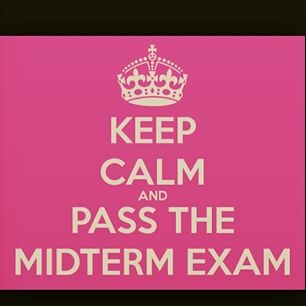Now that we have reached the middle of October, it is midterm season across campus. This means your students very likely have exams and major projects due around the same time for multiple classes. This is commonly a stressful time for students, when so many important things are closely packed together in a brief period. It isn't unusual that students may "forget" to call home, or they seem tired or distracted when you do speak with them.
Their course instructors are also doing several things besides grading those midterm tests and projects. Instructors have to report to the university whether a student has been attending class. Since academics are the core of a student's purpose at the University of Iowa, attendance is expected and required. Approval may be given for emergency absences, such as an unexpected illness that causes a student to miss a class. Some instructors will require a letter from a health care practitioner confirming the student was ill. Otherwise students must attend all lectures, small group discussions, and lab courses. If they do not, they risk being dismissed from the class for not attending (which may also impact their legal immigration status as well), or getting a poor grade at the end of the semester.
Instructors also report those students who are earning a grade of D or F as of the time midterms occur. The student gets a warning about this, so that they can work to improve their grade during the second half of the semester. International Student and Scholar Services has a staff member in the role of Support and Retention Coordinator, who will also reach out to those students performing poorly during midterms. She will offer to have them come in and speak with her about what is going on in their lives and what they think may be contributing to their low grades, and will recommend academic support resources around campus to help them improve.
Students should also go to see their professors or teaching assistants during their scheduled office hours. Unlike educational systems in some other places, professors very much want students coming to see them during office hours when the students are struggling or have questions. Students who take advantage of this tend to do better in class, and may also develop a good relationship with the professor, who could help with things like becoming a mentor or writing letters of recommendation in the future.
Too many low grades can lead to something called "academic probation," which happens when a student's grade point average is below the college or program requirement. Usually the student is given a warning and given one semester to bring the grades up. Failure to do this may mean the student is later "academically dismissed" from the University of Iowa. This means the university will not permit the student to register for one year. When this happens to an international student, they must either leave the U.S. or arrange to formally transfer to another school in the U.S. They cannot just stay in Iowa City without being registered for coursework, as this is a violation of the terms of immigration status and will cause significant problems with their immigration situation and ability to come back to the U.S. in the future.
We stress repeatedly to students how important it is to attend class, turn in assignments on time, and study for quizzes and tests so they can avoid receiving low grades that can impact their futures in the U.S.
Sometimes students do not want to tell parents when they are not doing well. They know you have a lot invested in their success, and they don't want to let you down or disappoint you. So it can be very difficult for a family member to really know how a student is doing.
This is one reason the University of Iowa has a program called the Guest Account for ISIS, which is the online information system students use for numerous things on campus. They see grades and academic alerts in ISIS, and they also can view the university bill. Course schedules and degree evaluations are also available.

All colleges and universities in the U.S. who receive funds from the federal government are subject to a law called FERPA: the Family Educational Rights and Privacy Act. The law dictates who can and cannot have access to student records. Basically, only students have the rights to that information if they are at or above 18 years old. Even parents who are paying for their student's education cannot access that information without the student's consent.
If your student is willing, they can arrange what is called a Guest Account. Instructions for them may be found on the University of Iowa website. They usually will need an email address that belongs to you, and then create a special password for your use. They indicate what specific information you will be able to view in ISIS: admissions profile, course schedule, grades, financial aid, and tuition/billing. The student has complete control over whether they wish to create such an account, and when they might wish to close it. If you are interested in this, have a talk with your student - they may not realize this is possible. We also have
I hope that all of your students do well during this fall's midterm season. They may feel the most challenge that they've ever felt so far, but they CAN get past it!